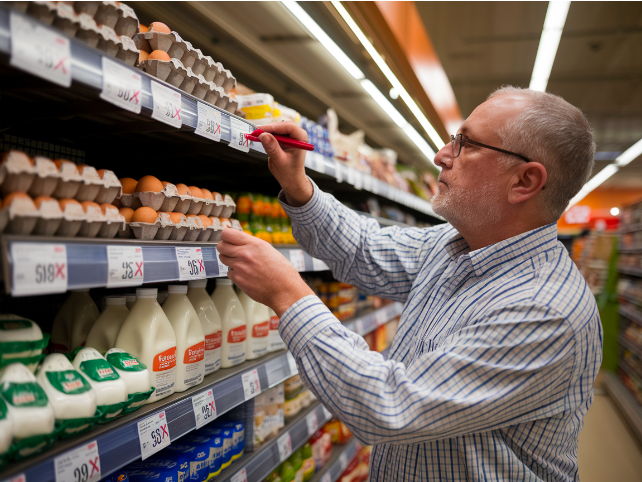News
Kroger Executive Admits to Price Gouging Staple Items Beyond Inflation Levels

The grocery industry is facing a public relations crisis after a top executive from Kroger admitted to price gouging on essential items like eggs and milk. During a recent antitrust trial, Andy Groff, Kroger's Senior Director for Pricing, disclosed that the company had raised prices on these staples beyond what inflation would justify. This revelation has triggered widespread concern among consumers and experts, who fear that this practice may be more common than previously thought.
Groff’s admission came during a Federal Trade Commission (FTC) hearing regarding Kroger’s proposed acquisition of Albertsons, one of its largest competitors. The FTC lawsuit argues that this merger could lead to reduced competition, potentially resulting in even higher prices for consumers.
Merger Raises Antitrust Concerns
At the heart of the FTC’s lawsuit against Kroger is the company’s planned $24.6 billion merger with Albertsons. This merger has raised alarms among regulators and consumer advocates who fear that combining two of the largest grocery chains in the country could significantly reduce competition in the market. The concern is that the merger would give Kroger-Albertsons excessive market power, potentially allowing the newly formed giant to set prices with minimal competitive pressure.
Critics argue that the lack of competition could lead to even more aggressive price gouging, as fewer players in the market would mean less incentive to keep prices low. The FTC's antitrust suit is a crucial test of the agency’s ability to prevent further consolidation in an industry that is already dominated by a small number of large players.
Kroger, on the other hand, argues that the merger would benefit consumers by creating efficiencies that could lead to lower prices. However, the recent revelations about price gouging cast doubt on these claims, leading to increased scrutiny of the merger's potential impact on the market.
Price Gouging: A Widespread Issue?
Drew Powers, founder of Powers Financial Group, was not surprised by the news. “Companies across multiple industries have been posting record profits since the COVID-19 crisis while consumers have faced the highest inflation in recent history,” Powers said. He suggests that Kroger is just one of many companies that have taken advantage of the situation to increase prices beyond what is necessary.
The admission that Kroger routinely surpassed inflation in pricing essential items like milk and eggs raises serious questions about the transparency and fairness of the grocery industry. Economists have long suspected that the sector, dominated by a few large chains like Kroger and Walmart, has been benefiting from pandemic-related supply chain disruptions to justify unwarranted price increases.
The Implications of Oligopoly in the Grocery Industry
Kevin Thompson, CEO of 9i Capital Group, believes Groff’s comments point to a broader issue within the current economic system. “We’ve moved away from true capitalism towards an oligarchic structure with less competition and larger players dominating the market,” Thompson said. He argues that this shift has reduced consumer choice and allowed companies to engage in practices like price gouging with little fear of repercussions.
Thompson noted that executives are often driven by the need to maximize shareholder wealth, even if it means pushing the boundaries of legal and ethical standards. “This pricing strategy was likely implemented to maximize profits,” he said, adding that other grocers may have engaged in similar practices.
Kroger’s Price Gouging Has More than Consumer Trust at Stake
Michael Ryan, founder of michaelryanmoney.com, warned that Kroger’s admission could have serious consequences. “It’s like catching a kid with their hand in the cookie jar,” Ryan said. “Kroger’s not alone in this game, but they might have bitten off more than they can chew with this admission.”
Ryan believes that consumers are increasingly aware of corporate practices and may respond by taking their business elsewhere. “Customers aren’t dumb,” Ryan said. “I’ve seen loyal shoppers jump ship as soon as they feel ripped off. Once that trust is gone, it’s hard to win them back.”
The fallout from this scandal could extend beyond Kroger, affecting other major players in the grocery industry as well. If consumers lose trust in their local grocers, the entire sector could face a significant backlash.
Will Kroger’s Admission of Price Gouging Put its Merger with Albertsons in Peril?
Kroger's price gouging admission is more than just a corporate misstep; it’s a symptom of a larger problem in the grocery industry. With fewer competitors and more power concentrated in the hands of a few large chains, consumers are left with limited choices and higher prices. This scandal serves as a wake-up call for both consumers and regulators to demand greater accountability and transparency from the companies that control our food supply.
Do you believe that Kroger and other grocery chains are justified in raising prices for staple items such as eggs and milk> Or, have you accepted the fact that many companies engaged in price gouging beyond inflation levels just because they can? Let us know what you think.



